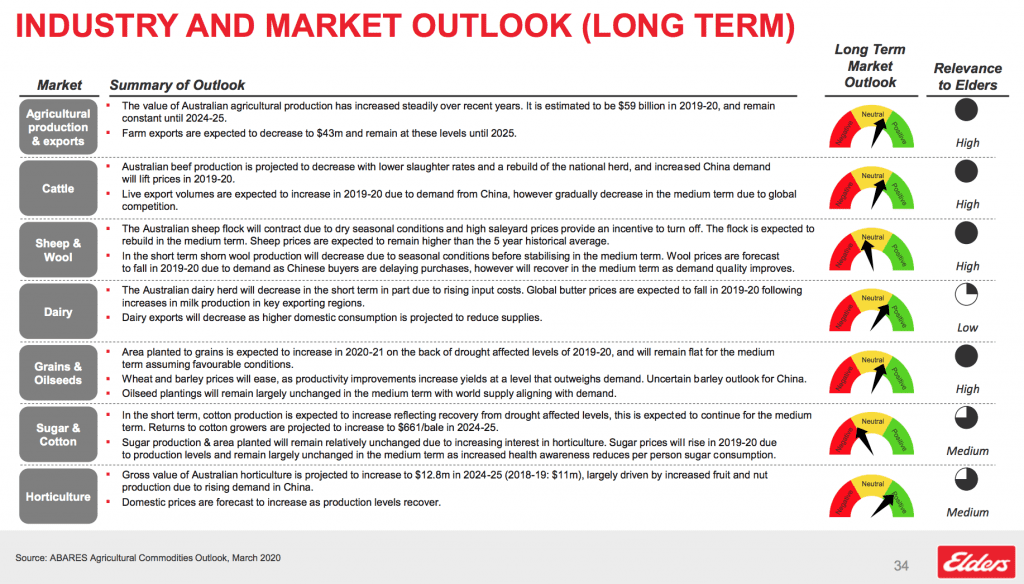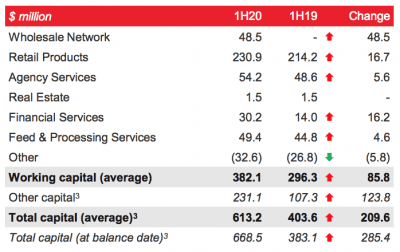In the final year of its second eight-point plan Elders Limited has pushed through drought, bushfire and the early impacts of COVID-19 to record a solid $52 million statutory net profit after tax for the six months to March 31, 2020, a 90 percent increase on the prior corresponding period.
 A 55 percent lift in underlying earnings before interest and tax (EBIT) to $52.8 million was boosted by recent winter crop confidence, high prices for both cattle and sheep, and steady earnings in real estate and financial services, CEO and managing director Mark Allison told a half year 2020 results briefing this morning.
A 55 percent lift in underlying earnings before interest and tax (EBIT) to $52.8 million was boosted by recent winter crop confidence, high prices for both cattle and sheep, and steady earnings in real estate and financial services, CEO and managing director Mark Allison told a half year 2020 results briefing this morning.
Revenue was also boosted by the acquisition in November of Australian Independent Rural Retailers (AIRR) contributed $8.6 million to EBIT.
Operating cash inflow of $27.4 million reflected EBITDA of $60.0 million.
This was offset by increased working capital in AIRR post settlement and higher retail product debtors due to increased sales activity. Elders expects a higher cash conversion in the second half as debtors are collected.
Highlights from the six month result included a 309 percent increase in operating cash flow to $27.4 million from -$13.1 million this time last year.
Return on capital also increased slightly to 17.7pc compared to 17.1pc in 1H2019.
Net debt levels reduced, while leverage and interest cover ratios continued to improve with increased earnings and the benefit of the capital raise in 2019, Mr Allison said.
He said the company has prospered in a volatile market as a result of “rock solid business foundations, strict financial discipline, and a commitment to keeping the safety and prosperity of clients and communities across Australia always at the forefront of priorities”.
“The first half of FY20 has been tumultuous, with devastating bushfires across large parts of Australia, the COVID-19 pandemic, and conversely, drought-breaking rain across many parts of Australia,” he said.
“Whilst difficult, these events have proved yet again the resilience of our people and our industry, and our ability to rise to the challenge.”
The core philosophy of Elders’ two eight-point plans since FY2014 have been high financial discipline, with safety, EBIT and return on capital considered the core metrics.
Elders recorded one lost time injury (a livestock agent suffered a fractured forearm in a saleyard) in the first half of FY20, consistent with the same time last year.
“One is one too many and we’re working very hard on that,” Mr Allison told this morning’s briefing.
“It is worth reflecting where we came from and FY13 was in the order of 34 lost time injuries in the business.
“Our desire is to get to zero and we’re working hard on that.”
Mr Allison said COVID-19 had not had a significant financial impact on demand for Elders’ products and services, customers and supply chains for the six months ended 31 March, and this has continued into April and May.
“Successive rainfall events across major cropping areas on the East Coast have had a positive impact on operational performance within the last period, lifting farmer confidence and driving strong demand for crop inputs,” said Mr Allison.
“This has contributed to a significant uplift in rural products, given the 66 percent decline in summer cropping (as reported in ABARES February 2020 Australian Crop Report).
“The growth in rural products margin has been lifted with the addition of AIRR to our wholesale network, contributing $8.6 million EBIT since 13 November 2019.”
Agency services results were up, driven by strong prices in cattle and sheep, limited domestic supply and continued demand from key export markets.
However, wool margins declined with lower bales sold due to lower prices deterring growers from trading.
Real estate delivered a higher result with sales turnover up across most service offerings.
Costs are up on last year by $12.0 million due to the AIRR acquisition, geographical footprint growth and additional corporate initiatives, offset by savings from the new rural bank distribution agreement.
FY20 Outlook

A summary of Elders long term outlook for key ag market sectors from today’s 1HFY2020 results presentation. Click to enlarge.
Subject to any future negative impacts arising from global volatility, Elders is on track to deliver a full year result in line with the consensus of analyst views of between $96.5 million and $112.9 million EBIT and $85.8 million and $102.9 million NPAT, Mr Allison said.
The company has forecast a positive outlook for winter crop on the back of recent rainfalls across the Eastern States.
Global COVID-19 implications will continue to create some ongoing uncertainty in both market demand and agricultural supply chains.
Some domestic AgChem suppliers were experiencing interruptions due to COVID19, which was being closely monitored, but China AgChem supply chains had returned to normal.
Livestock supply chains continue to operate without major disruption from COVID-19 with digital solutions in place to facilitate transactions alternatively to in-person methods.
Cattle and sheep prices are forecast to remain high.
Wool export to China is operationally sound, however the impact of reduced end-market demand in Europe and North America will likely continue to place downward pressure on price and volume.
Real estate residential sales and property management activities are expected to decline in line with the wider real estate market due to COVID-19 related restrictions and broader economic impacts.
Killara feedlot utilisation is expected to remain at high utilisation levels with limited impact from COVID-19, however, high end cattle may experience price pressures due to decreased demand for restaurant quality meat and exports.
Grain Central: Get our free daily cropping news straight to your inbox – Click here


HAVE YOUR SAY